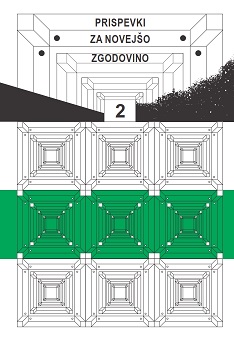Gospodarski in družbeni nazori v slovenskem naprednem taboru, 1930-35. II. del – idejnozgodovinski vidiki
Economic and Social Views in the Slovene Progressive Camp, 1930–35. Part II – The Intellectual Historical Aspects
Author(s): Oskar MulejSubject(s): Governance, Economic history, Political history, Economic policy, Political economy, Economic development, Interwar Period (1920 - 1939)
Published by: Inštitut za novejšo zgodovino
Keywords: liberalism; progressive camp; political economy; corporatism; intellectuals;
Summary/Abstract: In the period between 1933 and 1935 the ideas about an extended and stronger role of the state in the economic life were inrepressibly spreading throughout Yugoslavia and thus also among the politicians of the Slovene progressive camp. This fact was evident not only from the changed rhetoric, revealing a shift in the political-economic paradigm, but also from the programme documents of the Yugoslav National Party (JNS), which demonstrated a substantive deviation as well as a clear programmatic departure from the liberal principles of the socio-economic order. The aforelying second part of the treatise deals with the following questions: in what way and to what extent did the popular ideas of that time – about building a “new order” and “man” – resonate in the Slovene progressive camp; and whether the economic doctrines were in fact adopted or newly formed (including the ideas about “planned economy” and “corporatist state”). The discussion transcends the framework of party politics and attempts to encompass, from a wider intellectual historical aspect, the various viewpoints which emerged inside the broader ideological camp. These viewpoints ranged from the indisputably liberal to the entirely socialist ones, while also including such which criticized the unbound economy from explicitly liberal positions. Intellectual heterogeneity also manifested in diverse understandings and assessments of the so-called corporatist state. It can be claimed that the “corporatist state” and “planned economy” represented nothing more than fancy slogans and a rhetorical adaptation to the spirit of the age. Kramer's circle was thereby distinctly characterized by a categorical rejection of Nazism, fascism and communism, while the younger generation was more susceptible to certain aspects of the non-liberal “socio-economic models”.
Journal: Prispevki za novejšo zgodovino (before 1960: Prispevki za zgodovino delavskega gibanja)
- Issue Year: 56/2016
- Issue No: 2
- Page Range: 40-58
- Page Count: 19
- Language: Slovenian

